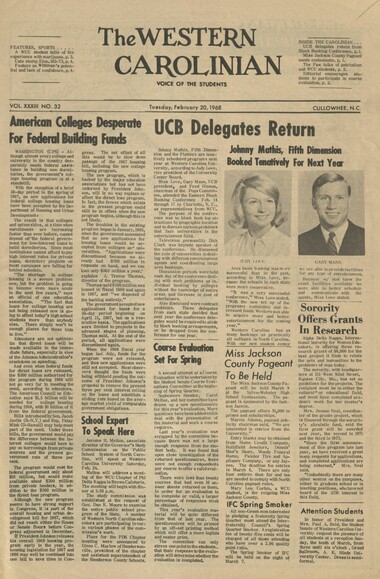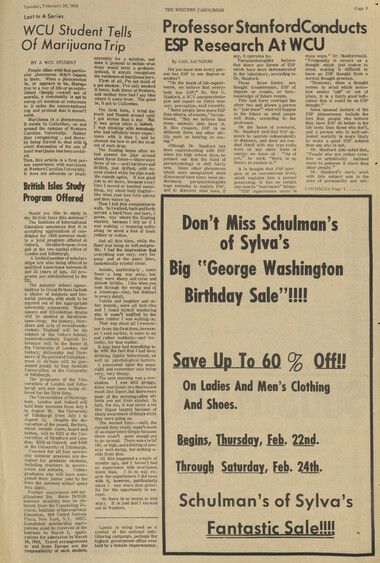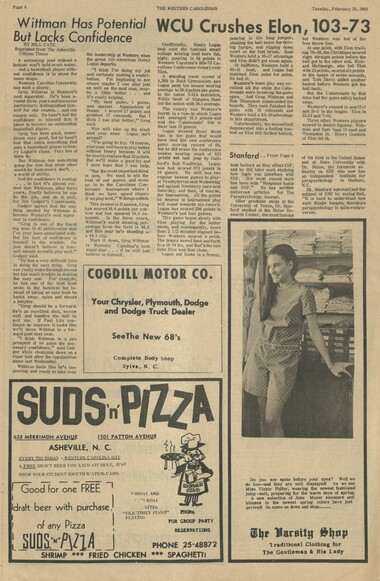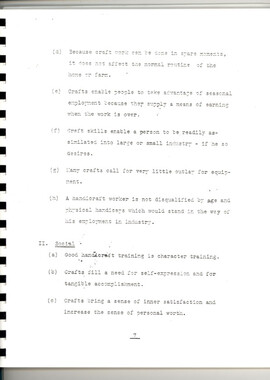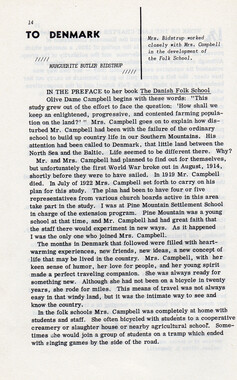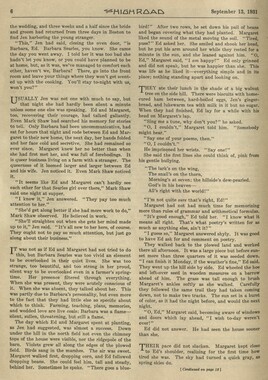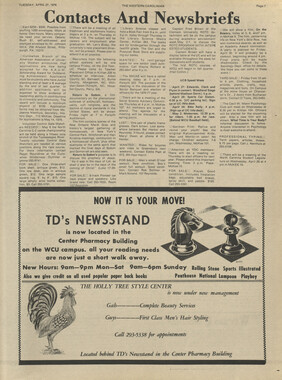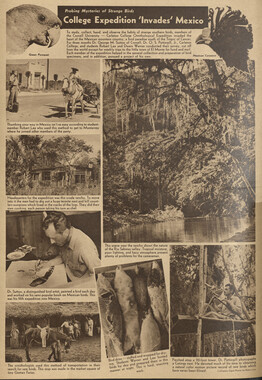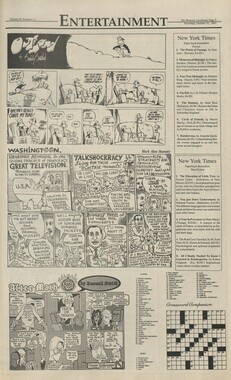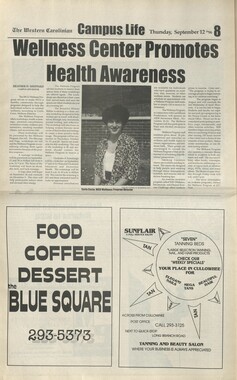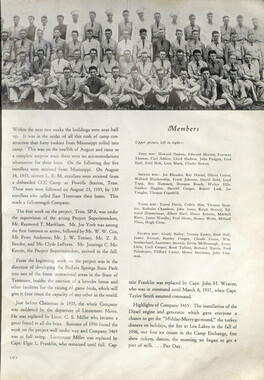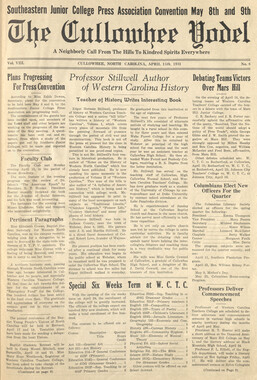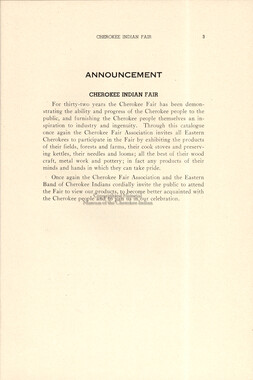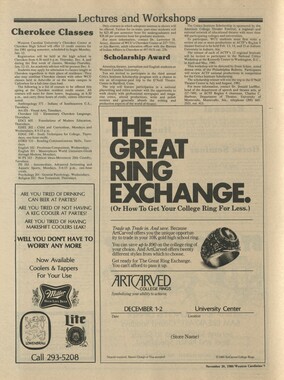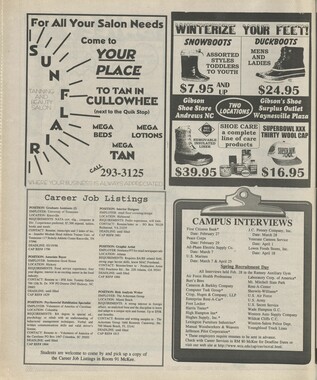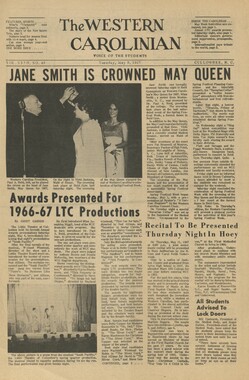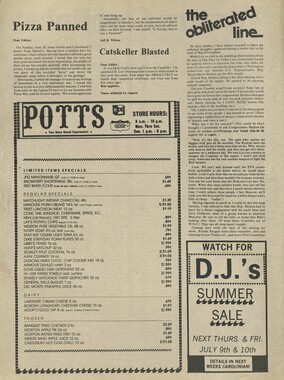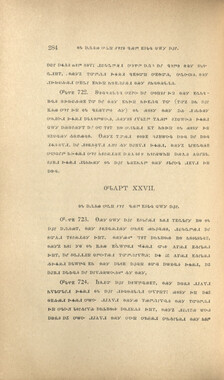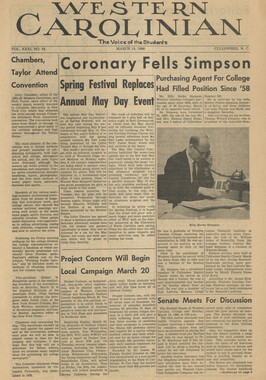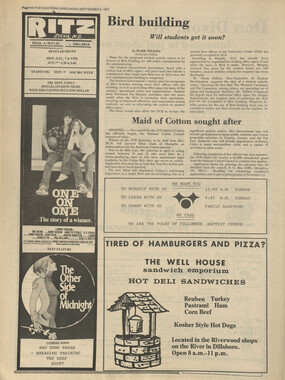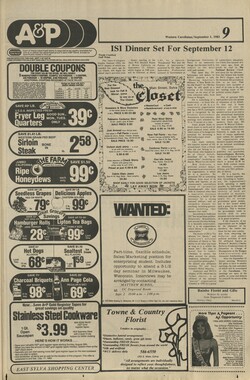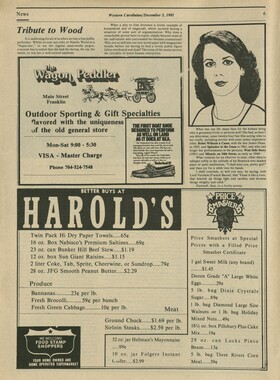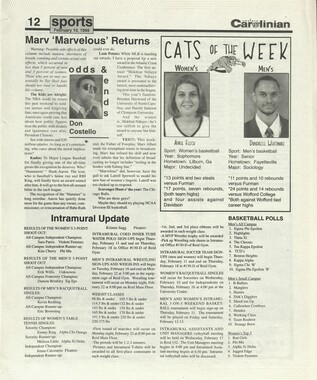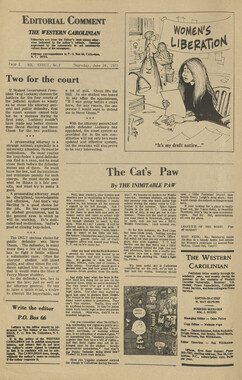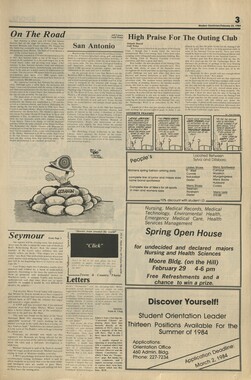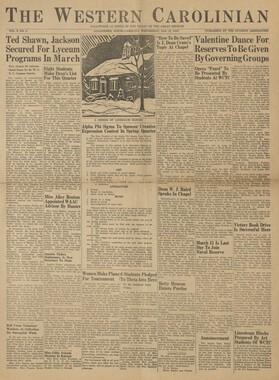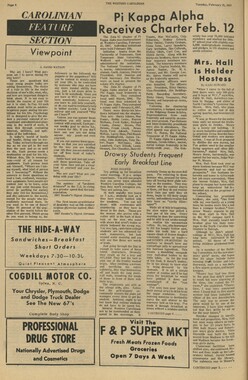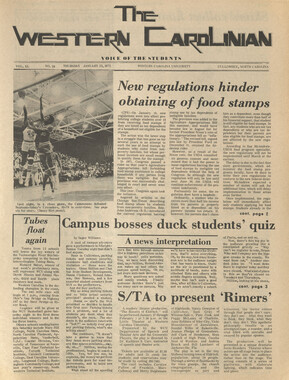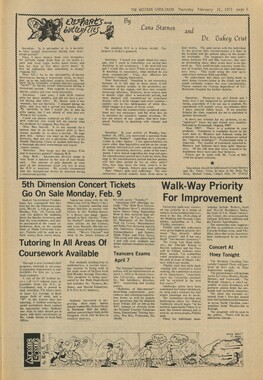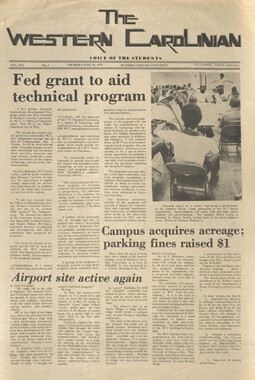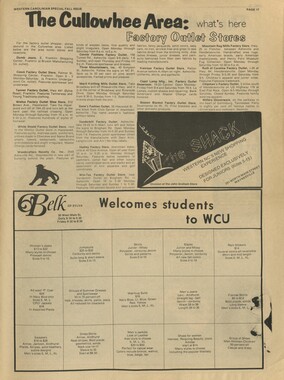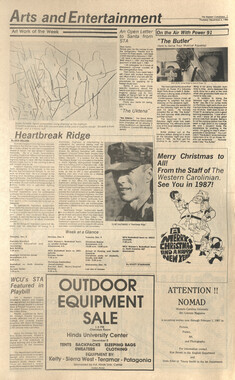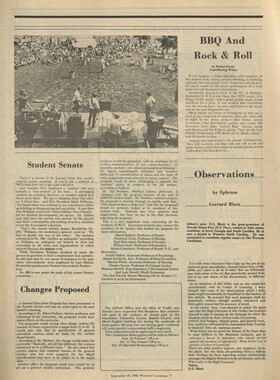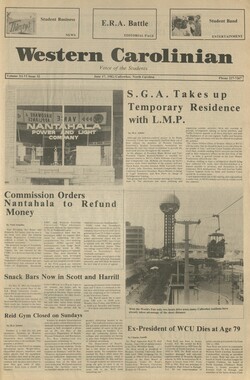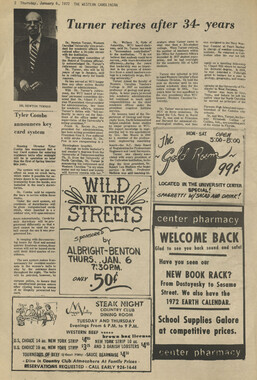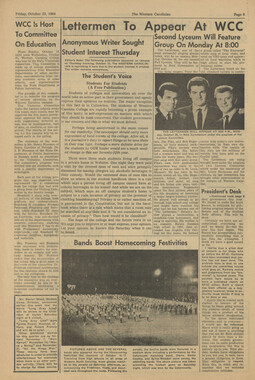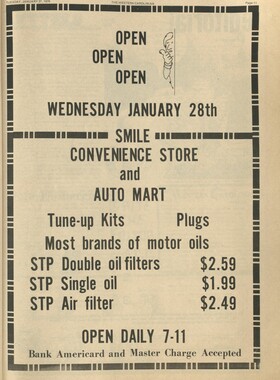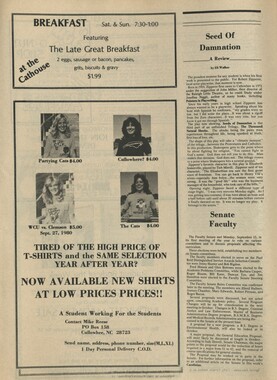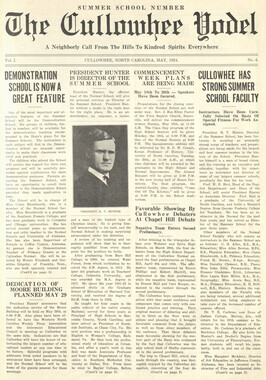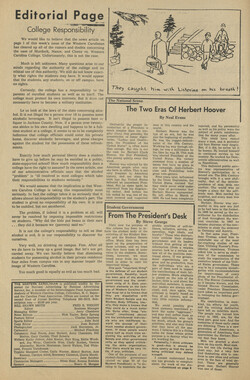Western Carolina University (20)
View all
- Canton Champion Fibre Company (2308)
- Cherokee Traditions (293)
- Civil War in Southern Appalachia (165)
- Craft Revival (1942)
- Great Smoky Mountains - A Park for America (2683)
- Highlights from Western Carolina University (430)
- Horace Kephart (941)
- Journeys Through Jackson (154)
- LGBTQIA+ Archive of Jackson County (15)
- Oral Histories of Western North Carolina (314)
- Picturing Appalachia (6679)
- Stories of Mountain Folk (413)
- Travel Western North Carolina (160)
- Western Carolina University Fine Art Museum Vitreograph Collection (129)
- Western Carolina University Herbarium (92)
- Western Carolina University: Making Memories (708)
- Western Carolina University Publications (2283)
- Western Carolina University Restricted Electronic Theses and Dissertations (146)
- Western North Carolina Regional Maps (71)
- World War II in Southern Appalachia (131)
University of North Carolina Asheville (6)
View all
- Allanstand Cottage Industries (62)
- Appalachian National Park Association (53)
- Bennett, Kelly, 1890-1974 (1295)
- Berry, Walter (76)
- Brasstown Carvers (40)
- Carver, George Washington, 1864?-1943 (26)
- Cathey, Joseph, 1803-1874 (1)
- Champion Fibre Company (233)
- Champion Paper and Fibre Company (297)
- Cherokee Indian Fair Association (16)
- Cherokee Language Program (22)
- Crowe, Amanda (40)
- Edmonston, Thomas Benton, 1842-1907 (7)
- Ensley, A. L. (Abraham Lincoln), 1865-1948 (275)
- Fromer, Irving Rhodes, 1913-1994 (70)
- George Butz (BFS 1907) (46)
- Goodrich, Frances Louisa (120)
- Grant, George Alexander, 1891-1964 (96)
- Heard, Marian Gladys (60)
- Kephart, Calvin, 1883-1969 (15)
- Kephart, Horace, 1862-1931 (313)
- Kephart, Laura, 1862-1954 (39)
- Laney, Gideon Thomas, 1889-1976 (439)
- Masa, George, 1881-1933 (61)
- McElhinney, William Julian, 1896-1953 (44)
- Niggli, Josephina, 1910-1983 (10)
- North Carolina Park Commission (105)
- Osborne, Kezia Stradley (9)
- Owens, Samuel Robert, 1918-1995 (11)
- Penland Weavers and Potters (36)
- Roberts, Vivienne (15)
- Roth, Albert, 1890-1974 (142)
- Schenck, Carl Alwin, 1868-1955 (1)
- Sherrill's Photography Studio (2565)
- Southern Highland Handicraft Guild (127)
- Southern Highlanders, Inc. (71)
- Stalcup, Jesse Bryson (46)
- Stearns, I. K. (213)
- Thompson, James Edward, 1880-1976 (226)
- United States. Indian Arts and Crafts Board (130)
- USFS (683)
- Vance, Zebulon Baird, 1830-1894 (1)
- Weaver, Zebulon, 1872-1948 (58)
- Western Carolina College (230)
- Western Carolina Teachers College (282)
- Western Carolina University (1794)
- Western Carolina University. Mountain Heritage Center (18)
- Whitman, Walt, 1819-1892 (10)
- Wilburn, Hiram Coleman, 1880-1967 (73)
- Williams, Isadora (3)
- Cain, Doreyl Ammons (0)
- Crittenden, Lorraine (0)
- Rhodes, Judy (0)
- Smith, Edward Clark (0)
- Appalachian Region, Southern (2393)
- Asheville (N.C.) (1886)
- Avery County (N.C.) (26)
- Blount County (Tenn.) (147)
- Buncombe County (N.C.) (1664)
- Cherokee County (N.C.) (283)
- Clay County (N.C.) (555)
- Graham County (N.C.) (233)
- Great Smoky Mountains National Park (N.C. and Tenn.) (478)
- Haywood County (N.C.) (3522)
- Henderson County (N.C.) (70)
- Jackson County (N.C.) (4692)
- Knox County (Tenn.) (21)
- Knoxville (Tenn.) (9)
- Lake Santeetlah (N.C.) (10)
- Macon County (N.C.) (420)
- Madison County (N.C.) (211)
- McDowell County (N.C.) (39)
- Mitchell County (N.C.) (132)
- Polk County (N.C.) (35)
- Qualla Boundary (981)
- Rutherford County (N.C.) (76)
- Swain County (N.C.) (2017)
- Transylvania County (N.C.) (247)
- Watauga County (N.C.) (12)
- Waynesville (N.C.) (68)
- Yancey County (N.C.) (72)
- Aerial Photographs (3)
- Aerial Views (60)
- Albums (books) (4)
- Articles (1)
- Artifacts (object Genre) (228)
- Biography (general Genre) (2)
- Cards (information Artifacts) (38)
- Clippings (information Artifacts) (191)
- Crafts (art Genres) (622)
- Depictions (visual Works) (21)
- Design Drawings (1)
- Drawings (visual Works) (184)
- Envelopes (73)
- Facsimiles (reproductions) (1)
- Fiction (general Genre) (4)
- Financial Records (12)
- Fliers (printed Matter) (67)
- Glass Plate Negatives (381)
- Guidebooks (2)
- Internegatives (10)
- Interviews (811)
- Land Surveys (102)
- Letters (correspondence) (1013)
- Manuscripts (documents) (619)
- Maps (documents) (159)
- Memorandums (25)
- Minutes (administrative Records) (59)
- Negatives (photographs) (5651)
- Newsletters (1285)
- Newspapers (2)
- Occupation Currency (1)
- Paintings (visual Works) (1)
- Pen And Ink Drawings (1)
- Periodicals (193)
- Personal Narratives (7)
- Photographs (12982)
- Plans (maps) (1)
- Poetry (5)
- Portraits (1654)
- Postcards (329)
- Programs (documents) (151)
- Publications (documents) (2237)
- Questionnaires (65)
- Scrapbooks (282)
- Sheet Music (1)
- Slides (photographs) (402)
- Sound Recordings (796)
- Specimens (92)
- Speeches (documents) (15)
- Tintypes (photographs) (8)
- Transcripts (322)
- Video Recordings (physical Artifacts) (23)
- Vitreographs (129)
- Text Messages (0)
- A.L. Ensley Collection (275)
- Appalachian Industrial School Records (7)
- Appalachian National Park Association Records (336)
- Axley-Meroney Collection (2)
- Bayard Wootten Photograph Collection (20)
- Bethel Rural Community Organization Collection (7)
- Blumer Collection (5)
- C.W. Slagle Collection (20)
- Canton Area Historical Museum (2110)
- Carlos C. Campbell Collection (198)
- Cataloochee History Project (65)
- Cherokee Studies Collection (4)
- Daisy Dame Photograph Album (5)
- Daniel Boone VI Collection (1)
- Doris Ulmann Photograph Collection (112)
- Elizabeth H. Lasley Collection (1)
- Elizabeth Woolworth Szold Fleharty Collection (4)
- Frank Fry Collection (95)
- George Masa Collection (173)
- Gideon Laney Collection (452)
- Hazel Scarborough Collection (2)
- Hiram C. Wilburn Papers (28)
- Historic Photographs Collection (236)
- Horace Kephart Collection (861)
- Humbard Collection (33)
- Hunter and Weaver Families Collection (1)
- I. D. Blumenthal Collection (4)
- Isadora Williams Collection (4)
- Jesse Bryson Stalcup Collection (47)
- Jim Thompson Collection (224)
- John B. Battle Collection (7)
- John C. Campbell Folk School Records (80)
- John Parris Collection (6)
- Judaculla Rock project (2)
- Kelly Bennett Collection (1314)
- Love Family Papers (11)
- Major Wiley Parris Civil War Letters (3)
- Map Collection (12)
- McFee-Misemer Civil War Letters (34)
- Mountain Heritage Center Collection (4)
- Norburn - Robertson - Thomson Families Collection (44)
- Pauline Hood Collection (7)
- Pre-Guild Collection (2)
- Qualla Arts and Crafts Mutual Collection (12)
- R.A. Romanes Collection (681)
- Rosser H. Taylor Collection (1)
- Samuel Robert Owens Collection (94)
- Sara Madison Collection (144)
- Sherrill Studio Photo Collection (2558)
- Smoky Mountains Hiking Club Collection (616)
- Stories of Mountain Folk - Radio Programs (374)
- The Reporter, Western Carolina University (510)
- Venoy and Elizabeth Reed Collection (16)
- WCU Gender and Sexuality Oral History Project (32)
- WCU Mountain Heritage Center Oral Histories (25)
- WCU Oral History Collection - Mountain People, Mountain Lives (71)
- WCU Students Newspapers Collection (1744)
- Western North Carolina Tomorrow Black Oral History Project (69)
- William Williams Stringfield Collection (2)
- Zebulon Weaver Collection (109)
- African Americans (388)
- Appalachian Trail (32)
- Artisans (521)
- Cherokee art (84)
- Cherokee artists -- North Carolina (10)
- Cherokee language (21)
- Cherokee pottery (101)
- Cherokee women (208)
- Church buildings (166)
- Civilian Conservation Corps (U.S.) (110)
- College student newspapers and periodicals (1830)
- Dams (94)
- Dance (1023)
- Education (222)
- Floods (60)
- Folk music (1015)
- Forced removal, 1813-1903 (2)
- Forest conservation (220)
- Forests and forestry (905)
- Gender nonconformity (4)
- Great Smoky Mountains National Park (N.C. and Tenn.) (154)
- Hunting (38)
- Landscape photography (10)
- Logging (103)
- Maps (84)
- Mines and mineral resources (8)
- North Carolina -- Maps (18)
- Paper industry (38)
- Postcards (255)
- Pottery (135)
- Railroad trains (69)
- Rural electrification -- North Carolina, Western (3)
- School integration -- Southern States (2)
- Segregation -- North Carolina, Western (5)
- Slavery (5)
- Sports (452)
- Storytelling (245)
- Waterfalls -- Great Smoky Mountains (N.C. and Tenn.) (66)
- Weaving -- Appalachian Region, Southern (280)
- Wood-carving -- Appalachian Region, Southern (328)
- World War, 1939-1945 (173)
Western Carolinian Volume 33 Number 32
Item
Item’s are ‘child’ level descriptions to ‘parent’ objects, (e.g. one page of a whole book).
-
-
FEATURES, SPORTS ..... A WCU student tells of his experience with marijuana, p. 3. Cats stomp Elon. 103-73, p. 4. Feature on Wittman's potential and lack of confidence, p. 4, TheWESTERN CAROLINIAN VOICE OF THE STUDENTS INSIDE THE CAROLINIAN , . . UCB delegates return from Block Booking Conference, p. 1, Miss Jackson County Pageant needs contestants, p. 1. The Paw talks of patriotism and WCU students, p. 2, Editorial encourages students to participate in course evaluation, p, 2. VOL. XXXIII NO. 32 Tuesday, February 20,1968 CULLOWHEE, N.C. American Colleges Desperate For Federal Building Funds UCB Delegates Return WASHINGTON (CPS) - Although almost every college and university in the country desperately needs federal assistance in building new dormitories, the government's college housing program is at a standstill. With the exception of a brief 30-day period in the spring of 1967, no new applications for federal college housing loans have been accepted by the Department of Housing and Urban Development* The result is that colleges and universities, at a time when enrollments are increasing faster than ever before, cannot depend on" the federal government for low-interest loans to build dormitories. Since most institutions cannot afford to pay high interest rates for private loans, dormitory projects on most campuses are falling far behind schedule. "The shortage in college housing is a severe problem now, but the problem is going to become even more acute in the next few years," says an official of one education association. "The fact that loans for college housing are not being released now is going to affect today's high school students more than anybody else. There simply won't be enough places for these kids to live." Educators are not optimistic that direct loans will be made available in the immediate future, especially in view of the Johnson Administration's crackdown on spending. And even when federal funds for direct loans are released, the $300 million authorized for the program during 1968 will not go very far in meeting the need, according to educators. The American Council on Education says $1.5 billion will be needed for college housing during 1968, with $1 billion of it from the federal government, Bills introduced by Sen. Jacob Javits (R-N.Y.) and Rep. Patsy Mink (D-Hawaii) may help meet part of the need. Under these bills, the government would pay the difference between the interest colleges would have to pay on borrowings from private sources and the present government rate of three per cent. The program would cost the federal government only about $10 million, but would make available about $300 million from private lenders, in addition to the $300 million in the direct loan program. Although the new program seems to have strong support in Congress, it is part of the overall housing and urban development bill for 1967, which did not reach either the House or Senate floors before Congress adjourned in December. If President Johnson releases his overall 1968 housing program early in the year, the housing legislation for 1967 and 1968 may well be combined into one bill to save time in Con gress. The net effect of all this would be to slow down passage of the 1967 housing bill, including the new college housing program. The new program, which is backed by the major education associations but has not been sndorsed by President Johnson, will in no way replace or affect the direct loan program. In fact, the freeze which exists in the present program could still be in effect when the new program begins, although this is not likely. The troubles in the existing program began in January, 1966, when the government announced that no new applications for housing loans would be accepted from colleges an'' universities. "Applications were discontinued because we already had $760 million in requests on hand, and we can loan only $300 million a year,' explains J. Trevor Thomas, director of the program. Thomas said $300 million was loaned in fiscal 1966 and again in 1967, and "we disposed of the backlog entirely." The government accepted new applications for loans for a 30-day period beginning on April 15, 1967, but on a restrictive basis. The applications were limited to projects in the advanced stages of planning, Thomas said. At the end of the period, all applications were discontinued again. When the 1968 fiscal year began las: July, funds for the program were not released, and thus new applications were still not accepted. Most observers thought the funds were being withheld pending the outcome of President Johnson's proposal to remove the present three per cent interest ceiling on the loans and substitute a sliding rate based on the average market yield of comparable government obligations. School Expert To Speak Here Jerome H. Melton, associate director of the Governor's Study Commission on the Public School System of North Carolina, will speak at Western Carolina University Saturday, Feb. 24. Melton will address a meeting of the WCU Chapter of Phi Delta Kappa in Brown Cafeteria. The meeting will begin with dinner at 5:30 p,m. The study commission was established at the request of Gov. Dan K, Moore to examine the entire public school program of the State. A number of Western North Carolina educators are participating invar- in various phases of the commission's work. Plans for the PDK Chapter meeting were announced by Glenn C, Marlow of Henderson- ville, president of the chapter and assistant superintendent of the Henderson County Schools. Johnny Mathis, Fifth Dimension and the Platters are tena tively scheduled programs next year at Western Carolina University, according to Judy Love, vice president of the University Center Board- Miss Love, Gary Mann, UCB president, and Fred Hinson, chairman of the Pops Committee, attended the Eastern Block Booking Conference Feb. 14 through 17 in Charlotte, N. C, as representatives from WCT. The purpose of the conference was to block book top attractions by geographic location and to discuss various problems that face universities in the entertainment field. Television personality Dick Clark was keynote speaker of the conference. He discussed the role of universities in dealing with different entertainment agents and coordinating large area bookings. Discussion periods were held each day of the conference dealing with such problems as in dividual booking by colleges without the knowledge of entire areas and increase in cost of entertainers. Also discussed were contract problems. Three delegates from each state decided that next year the conference delegates would be required to abide by block booking arrangements, or be dropped from the conference for one year. Course Evaluation Set Fix Spring A second attempt at a Course Evaluation will be undertaken by the Student Senate Course Evaluations Committee at the beginning of Spring Quarter. Sophomore Senator, Carol McRae, and her committee have drawn up a new questionnaire for this year's evaluation. More questions have been added-which deal with the presentation of the material and work a course requires. Last year's evaluation was scrapped by the committee because there was not a large enough response from the student body. It was found that upon close investigation of the returned questionnaires, there were not enough respondents per course to offer a valid evaluation. There were less than twenty courses that had even 10 answer sheets returned on them. In order for an evaluation to be complete or valid, a larger percentage of responses must be obtained. This year's evaluation material will be quite different from that of last year. The questionnaires will be printed by an off-set printing method which will offer a more legible and neater print. The committee can only stress one point to the students., that their response to the evaluation will determine whether the evaluation is completed. Johnny Mathis, Fifth Booked Teaalmly For Next Year JUDY LOVE Area block b:x>king was mure successful than in the past, according to Miss Love, because the schools in each state were more cooperative, "It was a very successful conference," Miss U>vestated. "With the new set up of the programs committee and increased funds Western was able to acquire more and better entertainment for the coming year." Western Carolina has as many bookings as practically all colleges in North Carolina. With our new student center Miss Jaclcson County Pageant To Be Held The Miss Jackson County Pageant will be held March 9 at the Sylva-Webster High School Gymnasium. The pageant is sponsored by the Jack ■ son Jacees. The pageant offers $1,000 in prises and scholarships. Marvin Adams, pageant publicity chairman said, "We are interested in entries from the University." Entry blanks may be obtained from Home Credit Company, Hollifield Jewelers, Dennis' Men's Store, Moody Funeral Home, Painter Tire and Appliance Company, or any Jay- cee. The deadline for entries is March 6. There are only four entires thus far and ten are needed to comply with North Carolina pageant rules. Mary Lou Corbin, a WCU student, is the reigning Miss Jackson County. IFC Spring Smoker All non-Greek men interested in pledging a fraternity Spring Quarter must attend the Interfraternity Council's Spring Quarter Smoker, A registration fee of twenty-five cents will be charged of all those attending who have over a 2.00 quality point ratio. The Spring Smoker of IFC will be held on the night of March 7. GARY MANN we are able to provide facilities for any type of entertainment. Because we now know (he exact facilities available we were able to better schedule and communicate with the agents, Miss Love stated. Sorority Offers Grants In Research Alpha Delta Kappa, International Sorority for Women Educators, is offering three research grants of $8,000 for the best project it finds to relate the arts and humanities to the problems of man today. The sorority, with headquarters at 115 West 92nd Street, Kansas City, Mo., has set no guidelines for the projects. The recipient must be in either the cultural*or educational field, and must have completed academic work for her master's degree, Mrs. Jeanne Neal, coordinator of the grants project, which is financed through the sororit- ty's altruistic fund, said the first grant will be awarded next year, the second in 1971 and the third in 1973, "Since the first announcement of this program late last year, we have received a great many requests for applications, and completed applications are being returned," Mrs. Neal said, "Undoubtedly there are many other women on the campuses, either in graduate school or in teaching positions, who have not heard of the ADK interest in this field, Attention Students In honor of President and Mrs. Paul A. Reid, the Student Senate of Western Carolina University request the pleasure of all students at a reception Sunday, the tenth of March, from three until six o'clock , Grand Ballroom, A, K. Hinds University Center. Dress is semi- formal.
Object
Object’s are ‘parent’ level descriptions to ‘children’ items, (e.g. a book with pages).
-
The Western Carolinian is Western Carolina University’s student-run newspaper. The paper was published as the Cullowhee Yodel from 1924 to 1931 before changing its name to The Western Carolinian in 1933.
-
